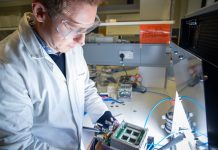
Scientists at the University of Sheffield are looking into a unique way to make clean energy more affordable.
The secret lies in a special type of battery storage called soluble lead flow batteries (SLFB), which they think could be perfect for supporting clean energy in developing countries.
What’s the big deal about energy storage, you ask?
Well, it’s all about making sure we have enough power even when conditions aren’t perfect for producing it. Imagine a wind farm on a still day or a solar power station at night.
If we can store the extra energy produced on windy or sunny days, we’ll have it ready for those quiet or dark times.
Batteries are great for storing energy because they can be installed just about anywhere without needing a lot of space or complicated systems. And this specific type of battery, the SLFB, is even better because it’s tough and lasts a long time.
The Sheffield researchers studied the costs of a 24 volt SLFB system designed to work with a solar charging station in Sierra Leone.
This station, built by Sheffield company Mobile Power, could bring clean energy to homes, businesses, and even electric car charging points.
The team ran lots of calculations and experiments to figure out the best balance between the battery system’s cost and performance.
They discovered that the sweet spot was a battery that could release its stored energy for four hours before needing a recharge. If all goes well, these batteries could cost less than £50 per kilowatt-hour, which is about half the cost of the lithium-ion batteries we commonly use now!
However, they did find a potential hurdle: the battery’s success depends on the ability to consistently create thick deposits of lead. Thinner deposits could make the battery more expensive and less efficient. The researchers haven’t yet conducted extensive tests on these lead deposits, so there’s still more to learn.
The lead researcher, Diarmid Roberts, said that this study is the first of its kind and offers a valuable insight into how lab-scale improvements can lead to real-world benefits in efficiency and cost.
They’re now hoping to get more funding and have recently filed a patent application. Their ultimate goal is to test their findings in a pilot system, bringing us one step closer to affordable, clean energy!
Follow us on Twitter for more articles about this topic.
Source: University of Sheffield.



